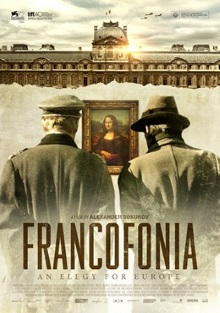
When I first added this to my list, I thought this was a movie. I only learned on the day I watched it, from a blog post by economist Scott Sumner, that it’s a documentary by Russian director Alexander Sokurov. Upon watching it, I found it utterly unlike any other documentary I’ve ever seen and has decidedly movie-like qualities.
Sokurov films himself, though the camera refrains from a head-on shot his face, in his study worrying about a container ship that is crossing a stormy sea. He intermittently attempts to speak to the captain of the vessel via video conference but is constantly cut off by the bad weather conditions. In the meantime, his thoughts turn to the Louvre, particularly during the German occupation of Paris during the Second World War. Two persons figure large in this film: Jacques Jaujard, the de facto director of the Louvre since everyone else has fled and Franz Wolff-Metternich, the German officer who is charged with carrying out Hitler’s orders to ensure that the most important European works of art are protected. Jaujard does his best to preserve the art by having them stored in palaces and castles all across France while Metternich supports him. Sokurov also muses about the centrality of culture to a state and the importance and significance of museums. He imagines himself meeting both Marianne, the spirit of France herself, and Napoleon Bonaparte, who was responsible for collecting so many of the art pieces, in the halls of the Louvre.
We all know what a conventional documentary looks like: interviews, solid facts and figures, a director that tries to present himself or herself as objective and so forth. Francofonia breaks all of these rules. This is very much an emotive piece by Sokurov, it’s meant less to convince the audience through a rational exposition of the facts and more to transport you on a poetic journey through space and time. His unconventional camera angles and movements encourage you to see familiar works of art with new eyes. He doesn’t bother telling you their names and their histories, assuming that most people watching this film would be savvy enough to recognize them on sight. But he does make you realize how beautiful these works are and appreciate what they really are. One scene has Napoleon visiting the Egyptian wing and coming across a mummy in a glass case, his gloved finger taps on it. It feels like he’s granting us permission to realize how creepy it is, to be open to the magical sense that the mummy might unfold its crossed arms and wake up at any moment.
The film is also daring in openly acknowledging that much of the priceless treasures of the Louvre was the fruit of conquest. Napoleon declares that it is after all the reason why he conquered his way through so much of Europe and Africa. The film isn’t blind either to ambiguity and contradiction. Sokurov takes an accusatory tone against the Vichy regime and seems to mock the idea of calling Paris an open city, as opposed to the French resisting the German invasion to the last as the Russians did. Yet he also acknowledges that doing so saved the Louvre and spared Parisians from the worst horrors of the war. He contrasts this with the terrible fate that befell the Hermitage Museum during the Siege of Leningrad and how it became a shelter for the defenders of the city. On the other hand, I’m somewhat confused about what Sokurov was trying to say about Captain Dirk, who seems to be an entirely fictional character, on the cargo ship. It seems like it’s just a metaphor for the difficulty of ferrying irreplaceable works of art across troubled times but isn’t that pushing a metaphor a bit too far?
All told, there’s little doubt that this is a breathtakingly ambitious and creative film that straddles the non-fictional and fictional worlds. It may not tell those who aren’t already familiar with the Louvre much about it, and indeed may have little value to those who have never visited the museum. But it’s impressive how it manages to convey the director’s personal feelings about the museum and sweep us along with it.